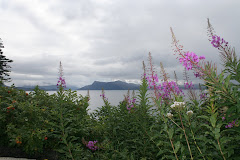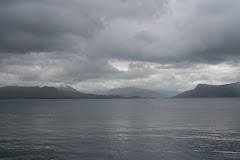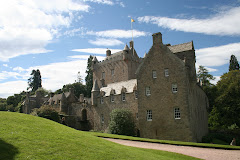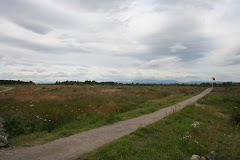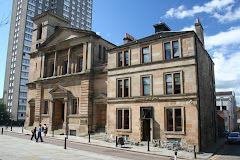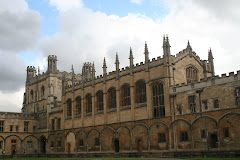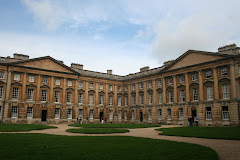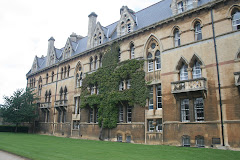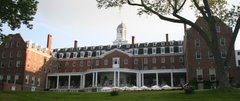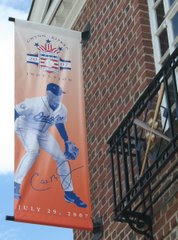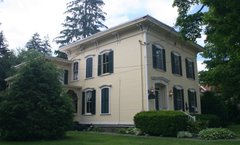I made it. The trains, as you know, from a previous post did not run. The rails were submerged. They may not be usable for upwards of two weeks or more. It was a very long bus ride, nearly ten hours. The congestion on the A6 through the heart of England into Scotland was severe. It looked like I95 south of Washington during a summer rush hour with vacationers and commuters all going in the same direction on a Friday afternoon. The extent of the flooding was evident along each side of the motorway. Rivers were well beyond their banks. Planted fields and pastureland alike were underwater. Some towns have been completely cut off, especially Tewkesbury. Others are without, and will be for a time, both water and power.
Pipe School is demanding. The memorization required is a little more than I am accustomed to, but, in time, my feeble brain may muster the energy to pull it off. Regrettably, the workload has allowed only the shortest of walks here and there in Glasgow. The Piping Centre is near the Glasgow School of Art and Glasgow University. The main building of the Art School, designed by Charles Rennie Mackintosh in the Arts and Crafts/Art Nouveau style, is impressive. It sits on a high ridge in the heart of the city. Its view of the city, and especially of the Clyde River, is memorable.
Glasgow feels like San Francisco on the back of one's calves. It also takes its toll on the neck. The ground floor of many buildings look quite modern. To appreciate the city's Victorian past, you have to look up to the first floor and beyond.
That's it for the moment. Peace.
Tuesday, July 24, 2007
Sunday, July 22, 2007
The Summer Floods of 2007
My stay in Oxford was extended by a day. I am hoping that is all. Not that I don't love Oxford. It's that I want to get to Glasgow to begin piping school.
The trains were suspended on Saturday because of the unprecedented heavy rains. The rails are underwater in the north and west. So, plan B. My hope is to catch a coach from the Oxford Station for Glasgow. I would much prefer a six hour train ride over a nine hour bus ride, but sometimes we simply do not get what we want. And to think that I believed that we did for such a long time.
To the Scotland pilgrims who are coming over on Friday, pack warm things and things that can keep you dry. The pattern, at least for now, seems to be a cool and wet one. Of course, things could change and do. Let's hope and pray that that is so. The floods have done more than inconvenience my travel. They have left a lot of people homeless and unemployed.
That's it for the moment. Peace.
The trains were suspended on Saturday because of the unprecedented heavy rains. The rails are underwater in the north and west. So, plan B. My hope is to catch a coach from the Oxford Station for Glasgow. I would much prefer a six hour train ride over a nine hour bus ride, but sometimes we simply do not get what we want. And to think that I believed that we did for such a long time.
To the Scotland pilgrims who are coming over on Friday, pack warm things and things that can keep you dry. The pattern, at least for now, seems to be a cool and wet one. Of course, things could change and do. Let's hope and pray that that is so. The floods have done more than inconvenience my travel. They have left a lot of people homeless and unemployed.
That's it for the moment. Peace.
Saturday, July 21, 2007
Christ Church, Part VII
By all accounts, I should be on a train headed north to Glasgow. I was looking forward to the eight-hour ride through England's Midlands and North Country, across into Scotland's Borderlands and Lowlands. The weather dictated otherwise. The hard rains and swift winds Oxford experienced on Friday were even harder to the north.
I arrived at the rail station in Oxford by taxi. I quickly learned that rail and coach travel north had been suspended until further notice. Flooding was extensive. Non-essential travel was discouraged. I took another taxi back to Christ Church. With the aid of a very helpful college porter, I made countless calls and discovered that rooms were being booked up rapidly. Unfortunatley, I could stay on at Christ Church. The next week's Oxford Experience was full. No room in the inn there. In time, I got a room at the Macdonald Randolph, a quarter-mile up the street from Christ Church. My rail ticket is good for six months. So, if the rails are above water and clear for tomorrow, I will be on my way. If not, I will sit tight for another day. I was regretting that I was unable to get out to Blenheim to see the Duke of Marlborough's palace, one of England's grandest and most impressive, which is also the birthplace and childhood home of Sir Winston Churchill. That may be my itinerary for tomorrow. If not that, then something else. There are plenty of good plan Bs to take up.
Last night was the farewell dinner in The Hall. Linen, crystal, silver. Dress was formal. It was a multi-course affair: scallops and fish with roe for the first course, pheasant with potatoes and greens for the next, dessert was a lemon and black cherry mousse with a heavy whipped cream topping followed by port wine and chocolate.
That's it for the moment. Peace.
I arrived at the rail station in Oxford by taxi. I quickly learned that rail and coach travel north had been suspended until further notice. Flooding was extensive. Non-essential travel was discouraged. I took another taxi back to Christ Church. With the aid of a very helpful college porter, I made countless calls and discovered that rooms were being booked up rapidly. Unfortunatley, I could stay on at Christ Church. The next week's Oxford Experience was full. No room in the inn there. In time, I got a room at the Macdonald Randolph, a quarter-mile up the street from Christ Church. My rail ticket is good for six months. So, if the rails are above water and clear for tomorrow, I will be on my way. If not, I will sit tight for another day. I was regretting that I was unable to get out to Blenheim to see the Duke of Marlborough's palace, one of England's grandest and most impressive, which is also the birthplace and childhood home of Sir Winston Churchill. That may be my itinerary for tomorrow. If not that, then something else. There are plenty of good plan Bs to take up.
Last night was the farewell dinner in The Hall. Linen, crystal, silver. Dress was formal. It was a multi-course affair: scallops and fish with roe for the first course, pheasant with potatoes and greens for the next, dessert was a lemon and black cherry mousse with a heavy whipped cream topping followed by port wine and chocolate.
That's it for the moment. Peace.
Christ Church, Part VII
I am sure learning was this much fun when I was younger, but I can’t remember.
Today in class we shared our ten metaphors of a famous person. It was very informative. Here is another one of mine that I was quite proud of: “He is the salted ham that leaves you thirsty and the ill-tasting tap water that will not quench the thirst.” One more: “He is a street, whose directional signs have all been changed by pranksters, upon which everyone now becomes lost.” Our goal was to craft metaphors written so well that they did not need explanation. Additionally they had to be true for the person about whom we were writing.
We compared and contrasted the difference between authors showing readers something and authors telling readers something. We looked at the techniques of description, narrative summation, and immediate scene. Our evening’s assignment is to write a six-line immediate scene. Immediate scenes are the portions of any piece of prose where the action occurs before the reader’s eyes. The rule of thumb is if you can film it, it is an immediate scene. Many novels use narrative summaries between immediate scenes to tell their stories.
It’s Friday. The day did not break. The clouds that rolled in sometime during the night remained low and heavy. The rain was steady and unrelenting. I’ve discovered that Englishmen and Englishwomen, in the face of such weather, simply remark, “Lovely weather.” They are the lords and ladies of irony.
Last evening I went to see “A Midsummer Night’s Dream” in the gardens of Oxford’s Wadham College. The actors were from major theater companies throughout the United Kingdom, most from London. It was well done. The director exaggerated the physical humor aspects of the play to the crowd’s delight. I tried to remember the last time I belly-laughed at a Shakespeare production. It was nice to hear the play’s language spoken so well by native speakers, not that Americans are not native speakers of the English language, but you know what I mean.
In the afternoon, whose weather was unnatural (that’s the English word for clear, sunny, and warm) I visited the Oxford University Museum of Natural History and the Bodleian Library’s Italy’s Three Crown’s exhibit. The Christ Church mathematician Charles Dodgson, better known as Lewis Carroll, frequented the Museum of Natural History often. It is where he got the ideas for the characters that inhabited the adventurous stories he told the college dean’s young daughter, Alice Liddell. The flamingo croquet mallet and the hedgehog ball were there. So too was the dodo and the duck, the tortoise and the owl and so on.
The Three Crown’s exhibit featured the three earliest and most influential Italian writers – Dante, Petrarch, and Boccaccio. On display were original manuscripts as well as first printed editions of Dante’s Divine Comedy (1306), Petrarch’s Book of Poems (1336), and Boccaccio’s Decameron (1349). I discovered that the Bodleian contains one of the most important collections of Italian literary works outside Italy.
Believe it or not, there was still time to sit quietly and read in the Meadow Quad’s walled Master’s Garden. From my perch, I could see the spires of the chapels of at least six colleges. At six o’clock, their bells all begun to toll at once, just enough out of sync with one another on the hour as to provide an enchanting echo effect.
That’s it for the moment. Peace.
Today in class we shared our ten metaphors of a famous person. It was very informative. Here is another one of mine that I was quite proud of: “He is the salted ham that leaves you thirsty and the ill-tasting tap water that will not quench the thirst.” One more: “He is a street, whose directional signs have all been changed by pranksters, upon which everyone now becomes lost.” Our goal was to craft metaphors written so well that they did not need explanation. Additionally they had to be true for the person about whom we were writing.
We compared and contrasted the difference between authors showing readers something and authors telling readers something. We looked at the techniques of description, narrative summation, and immediate scene. Our evening’s assignment is to write a six-line immediate scene. Immediate scenes are the portions of any piece of prose where the action occurs before the reader’s eyes. The rule of thumb is if you can film it, it is an immediate scene. Many novels use narrative summaries between immediate scenes to tell their stories.
It’s Friday. The day did not break. The clouds that rolled in sometime during the night remained low and heavy. The rain was steady and unrelenting. I’ve discovered that Englishmen and Englishwomen, in the face of such weather, simply remark, “Lovely weather.” They are the lords and ladies of irony.
Last evening I went to see “A Midsummer Night’s Dream” in the gardens of Oxford’s Wadham College. The actors were from major theater companies throughout the United Kingdom, most from London. It was well done. The director exaggerated the physical humor aspects of the play to the crowd’s delight. I tried to remember the last time I belly-laughed at a Shakespeare production. It was nice to hear the play’s language spoken so well by native speakers, not that Americans are not native speakers of the English language, but you know what I mean.
In the afternoon, whose weather was unnatural (that’s the English word for clear, sunny, and warm) I visited the Oxford University Museum of Natural History and the Bodleian Library’s Italy’s Three Crown’s exhibit. The Christ Church mathematician Charles Dodgson, better known as Lewis Carroll, frequented the Museum of Natural History often. It is where he got the ideas for the characters that inhabited the adventurous stories he told the college dean’s young daughter, Alice Liddell. The flamingo croquet mallet and the hedgehog ball were there. So too was the dodo and the duck, the tortoise and the owl and so on.
The Three Crown’s exhibit featured the three earliest and most influential Italian writers – Dante, Petrarch, and Boccaccio. On display were original manuscripts as well as first printed editions of Dante’s Divine Comedy (1306), Petrarch’s Book of Poems (1336), and Boccaccio’s Decameron (1349). I discovered that the Bodleian contains one of the most important collections of Italian literary works outside Italy.
Believe it or not, there was still time to sit quietly and read in the Meadow Quad’s walled Master’s Garden. From my perch, I could see the spires of the chapels of at least six colleges. At six o’clock, their bells all begun to toll at once, just enough out of sync with one another on the hour as to provide an enchanting echo effect.
That’s it for the moment. Peace.
Wednesday, July 18, 2007
Christ Church, Part V
Class continues to be engaging and stimulating. Today we took a new approach to character description that moves beyond, "He was a tall dark stranger," to highly metaphorical speech. It took some getting used to. Once I got the hang of it, I liked it. Here's one of mine: "He is a moss-coated stone lodged deep in the mud, a cymbal sounding off beat and out of time." The idea is to show your readers qualities of characters using multi-sensory metaphors rather than telling them informational details about a character.
In the afternoon, I took a bus to nearby Broughton Castle in Banbury, Oxfordshire -- about an hour north of Oxford. The house is a medieval manor house, later transformed into a Tudor mansion. The house is surrounded by a wide moat and parkland. One of the house's early owners, a baron, witnessed King John's signing of the Magna Carta in 1215. The house is also historically significant as a parliamentary rallying place in the 17th century. There are numerous impressive portraits of Oliver Cromwell in the house, which was besieged by the royalists during the English Civil War. The house's walled garden, The Ladies Garden, a full acre in size, is filled with sculpted boxwoods, old rose varieties, herbaceous borders and shrubs. By the way, Lord and Lady Saye and Sele still reside in the house. Today's weather was remarkable -- bright blue sky, billowy white clouds, brilliant sunshine.
This evening I attended Evensong in Christ Church Cathedral. Very high, very formal and very moving. I had never heard four-part choral music sung quite so exquisitely, reverently, and joyfully. The setting, a 14th century cathedral, probably contributed to the worship service's effect on me. The prayers for peace were particularly moving.
Dinner followed worship which, in Anglican fashion I suspect, was followed by a Scottish whisky tasting led by the Steward of Christ Church. I learned a great deal. One of the things that I learned is that whisky is okay, but I couldn't make a habit of it. The gentleman I sat beside, director of the Christ Church Choir, is originally from Scotland. He chided me for not finishing each and every sample as he most certainly did. Doing so would have involved downing no less that eight or more ounces of whisky, which would have been far beyond my tolerance.
That's it for the moment. Peace.
In the afternoon, I took a bus to nearby Broughton Castle in Banbury, Oxfordshire -- about an hour north of Oxford. The house is a medieval manor house, later transformed into a Tudor mansion. The house is surrounded by a wide moat and parkland. One of the house's early owners, a baron, witnessed King John's signing of the Magna Carta in 1215. The house is also historically significant as a parliamentary rallying place in the 17th century. There are numerous impressive portraits of Oliver Cromwell in the house, which was besieged by the royalists during the English Civil War. The house's walled garden, The Ladies Garden, a full acre in size, is filled with sculpted boxwoods, old rose varieties, herbaceous borders and shrubs. By the way, Lord and Lady Saye and Sele still reside in the house. Today's weather was remarkable -- bright blue sky, billowy white clouds, brilliant sunshine.
This evening I attended Evensong in Christ Church Cathedral. Very high, very formal and very moving. I had never heard four-part choral music sung quite so exquisitely, reverently, and joyfully. The setting, a 14th century cathedral, probably contributed to the worship service's effect on me. The prayers for peace were particularly moving.
Dinner followed worship which, in Anglican fashion I suspect, was followed by a Scottish whisky tasting led by the Steward of Christ Church. I learned a great deal. One of the things that I learned is that whisky is okay, but I couldn't make a habit of it. The gentleman I sat beside, director of the Christ Church Choir, is originally from Scotland. He chided me for not finishing each and every sample as he most certainly did. Doing so would have involved downing no less that eight or more ounces of whisky, which would have been far beyond my tolerance.
That's it for the moment. Peace.
Christ Church, Part IV
Another full and satisfying day.
In writing class we read brief narratives we had written using ourselves as one of the characters in the story. The goal was to be persuasive. Truthfulness was not necessary. Credibility, however, was. The class then discussed whether the author was telling the “truth” or not. If you said a writer’s story was true, you had to defend your estimation. If you concluded otherwise; false, you had to defend it as well.
Our criteria for evaluation included questions on the order of is the story credible? Is there adequate suspense? Is it informative? Is it located believably in an historical era? Are the details sufficient? Is there humor? What about the rhythm of the language? Does it raise questions that matter to the reader? What is the atmosphere? Is the hero/heroine up to the task?
In the words of Mark Twain, “I told the truth, mostly.” The class determined that I was believable.
We then turned our attention to lipograms as a way of getting the brain to fire in new and different ways. A lipogram is an ancient literary form, usually verse but not exclusively so, where the author disciplines himself or herself to write a set number of words on a particular subject avoiding the use of one or more vowels. We had to write 50 words, no more or less, on the subject of high heeled shoes without using the letter “e.” We also had to write 50 words, again – no more or less, on cars without using either the letters “a” or “i.” If you love words and are looking for new brain workouts, try this one.
We also worked on several scrambled acrostics. Each student wrote each letter of the alphabet in random order at the top of a sheet of paper. He or she then placed the paper on a table in the center of the room. Each student then selected a sheet other than his or her own in order to write a 26 word poem or narrative using words that began with the letters in the order in which they appeared. For example, if I picked up a piece of paper and the first letters among the 26 were I, W, A, D, S, N, then I could write something like “It was a dark, stormy night” a la Snoopy of Peanuts fame. The results in the class were impressive. I was proud of my contribution. Again, the goal is to kindle and foster creativity and imagination in the use of words.
In the afternoon, I toured the university’s Bodleian (pronounced Bod-lin) Library. The library opened in 1488 and is named for its greatest early champion, Sir Thomas Bodley, who oversaw its expansion from 1598 through 1602. Its earliest collection, which dates from the 15th century, was a gift from Humphrey, Duke of Gloucester. It includes scholastic and legal manuscripts, many of which are from the Italian Renaissance. The smell of very old wooden shelves, paper, and leather bindings is intoxicating.
After my tour of the library I perused Blackwells, which is Oxford’s premier bookstore. It, like everything else in Oxford, has been around since time immemorial. In good Calvinistic fashion, I limited myself to one hour and the purchase of one book. Also, in good Calvinistic fashion, I may have to go back tomorrow for another hour (or more) and another book (or more). Truth be told, I wanted to spend some time out of doors, given the bright blue sky that was appearing after the clouds of a typical English summer day dispersed.
With the sun on my shoulders, I took in the university’s early 17th century Botanic Garden. The garden is along the shore of the confluence of the Cherwell and Thames Rivers just across from Magdalen College. The highlight of my stroll was the centuries old Black Pine tree, pinus nigra. It is awe-inspiring to contemplate the persons who have walked in its shade on similar sunny summer afternoons.
Once again, I dined in The Hall. Here is the grace that was said before the evening meal. It was said in Latin. I will provide you with the English translation. This particular grace dates to 1546.
“Let all thy works acknowledge thee, O Lord, and let all thy saints bless thee.
Almighty and eternal God, we give thanks to thee for thy favours to all men, for the lord King (this would be Henry VIII) our first noble Founder, and for the other benefactors of this House; and we beseech thee that, using these gifts aright, we with them may rise again to life in heaven, through Jesus Christ our Lord. Amen.”
I ended my day with a visit to several pubs, all of which date to either the 14th, 15th, or 16th centuries – The Eagle and Child, fondly referred to as the Bird and Baby (the favorite watering hole of C.S. Lewis and J.R.R. Tolkein), The King’s Arms, and The Turf Pub.
Can you tell I am having fun?
That’s it for the moment. Peace.
In writing class we read brief narratives we had written using ourselves as one of the characters in the story. The goal was to be persuasive. Truthfulness was not necessary. Credibility, however, was. The class then discussed whether the author was telling the “truth” or not. If you said a writer’s story was true, you had to defend your estimation. If you concluded otherwise; false, you had to defend it as well.
Our criteria for evaluation included questions on the order of is the story credible? Is there adequate suspense? Is it informative? Is it located believably in an historical era? Are the details sufficient? Is there humor? What about the rhythm of the language? Does it raise questions that matter to the reader? What is the atmosphere? Is the hero/heroine up to the task?
In the words of Mark Twain, “I told the truth, mostly.” The class determined that I was believable.
We then turned our attention to lipograms as a way of getting the brain to fire in new and different ways. A lipogram is an ancient literary form, usually verse but not exclusively so, where the author disciplines himself or herself to write a set number of words on a particular subject avoiding the use of one or more vowels. We had to write 50 words, no more or less, on the subject of high heeled shoes without using the letter “e.” We also had to write 50 words, again – no more or less, on cars without using either the letters “a” or “i.” If you love words and are looking for new brain workouts, try this one.
We also worked on several scrambled acrostics. Each student wrote each letter of the alphabet in random order at the top of a sheet of paper. He or she then placed the paper on a table in the center of the room. Each student then selected a sheet other than his or her own in order to write a 26 word poem or narrative using words that began with the letters in the order in which they appeared. For example, if I picked up a piece of paper and the first letters among the 26 were I, W, A, D, S, N, then I could write something like “It was a dark, stormy night” a la Snoopy of Peanuts fame. The results in the class were impressive. I was proud of my contribution. Again, the goal is to kindle and foster creativity and imagination in the use of words.
In the afternoon, I toured the university’s Bodleian (pronounced Bod-lin) Library. The library opened in 1488 and is named for its greatest early champion, Sir Thomas Bodley, who oversaw its expansion from 1598 through 1602. Its earliest collection, which dates from the 15th century, was a gift from Humphrey, Duke of Gloucester. It includes scholastic and legal manuscripts, many of which are from the Italian Renaissance. The smell of very old wooden shelves, paper, and leather bindings is intoxicating.
After my tour of the library I perused Blackwells, which is Oxford’s premier bookstore. It, like everything else in Oxford, has been around since time immemorial. In good Calvinistic fashion, I limited myself to one hour and the purchase of one book. Also, in good Calvinistic fashion, I may have to go back tomorrow for another hour (or more) and another book (or more). Truth be told, I wanted to spend some time out of doors, given the bright blue sky that was appearing after the clouds of a typical English summer day dispersed.
With the sun on my shoulders, I took in the university’s early 17th century Botanic Garden. The garden is along the shore of the confluence of the Cherwell and Thames Rivers just across from Magdalen College. The highlight of my stroll was the centuries old Black Pine tree, pinus nigra. It is awe-inspiring to contemplate the persons who have walked in its shade on similar sunny summer afternoons.
Once again, I dined in The Hall. Here is the grace that was said before the evening meal. It was said in Latin. I will provide you with the English translation. This particular grace dates to 1546.
“Let all thy works acknowledge thee, O Lord, and let all thy saints bless thee.
Almighty and eternal God, we give thanks to thee for thy favours to all men, for the lord King (this would be Henry VIII) our first noble Founder, and for the other benefactors of this House; and we beseech thee that, using these gifts aright, we with them may rise again to life in heaven, through Jesus Christ our Lord. Amen.”
I ended my day with a visit to several pubs, all of which date to either the 14th, 15th, or 16th centuries – The Eagle and Child, fondly referred to as the Bird and Baby (the favorite watering hole of C.S. Lewis and J.R.R. Tolkein), The King’s Arms, and The Turf Pub.
Can you tell I am having fun?
That’s it for the moment. Peace.
Monday, July 16, 2007
Christ Church, Part III
An amazing day. In class, we explored characterization. We differentiated between positive and negative characteristics, between active and passive. We talked about what characters need to possess in order to drive a story.
The instructor is more interested in honing the imagination than discussing the do’s and don’ts of technique. Our ten-member class of students has been divided into two groups of three and one group of four. I am in the group of four. Our task is to present fifteen words to the class with definitions and an example of usage. Ten of the words will be true as will be their definitions. Five of the words will be made up, so too will their definitions and their usage sentences. The goal is to persuade the class of the truth of all of the words. The instructor’s point is that good fiction writing involves making one’s lies as believable as the truth. Lying is the analogy he uses for fiction writing. By lying he means that an author makes up a story. Characters, plot, setting, and all the rest are fabrications. Still, the truth told through the story can be quite large all the same.
In the afternoon I took a guided tour of many of the Oxford University colleges – not all and not most, but many. Remember, there are 39 colleges in all. And I thought Boston was a college town. I took a copious number pictures. I will post them in due time. I am using a public access point here at Christchurch to paste narrative to the blog. When I get home or to a place where I have the time and the connection to paste photos I will.
Here are the colleges I toured:
All Souls – no undergraduate students at all, post-doctorate research fellows only; founded to pray for all the souls of men who died in service to England in its wars against France – an interesting beginning for an institution of higher learning.
Balliol – Holder of the largest single collection of medieval manuscripts in England. John Wyclif, translator of the Bible into English, was a graduate and served as the college’s master in the mid-14th century.
Corpus Christi – Smallest of the Oxford colleges with less than 300 students. Most of each of the other colleges have roughly 500 students.
Hertford – Founded as Hertford Hall in 1282 is composed of three quadrangles dating from the 15th through the 20th century.
Jesus – Founded in 1571 by Elizabeth. First to admit women in the late 19th century.
Lincoln – One of Oxford’s oldest, founded in 1427.
Merton – Again, one of the oldest. The stained glass windows in its chapel are among the oldest and rarest in England. They date to the 13th century. For what it’s worth, my favorite. You will see why in the photographs.
New – Notice the name, it reflects the college’s relatively late founding date of 1379. Its founder was the Bishop of Winchester, William of Wykeham.
Oriel – Founded in 1324 and dedicated to St. Mary. This is for all Carolinians – Sir Walter Raleigh is among the school’s graduate. This is for Maren – Oriel has the most successful punting (read crew) record. The pub off of Tom Quad has an impressive array of gold-leaf inscribed paddles attesting the godlike qualities of Oriel's punting teams down through the centuries.
Trinity – A place of study since 1286.
University College – Home to Rhodes scholars from around the globe. Our guide was kind enough to point out Bill Clinton’s room. Our guide had done his homework and was able to provide us with a list of books Clinton checked out of the library. Our former president read an inordinate amount of works by Rousseau and Hobbes as a young man. UC is also the school which Percy Shelley attended. He did not graduate. He was expelled for his paper in defense of atheism. Now, there is a sizable statue of Shelley at UC as well as tributes to his genius as a poet and contributor to British verse.
Admission to Oxford, as one might well imagine, is competitive, to say the least. The method of instruction is unique. There are three eight-week terms each academic year. It ordinarily take three years to earn the bachelor of arts degree. Each student takes, on average, three courses of study each term. Weekly, he or she meets for one hour with his or her tutor to discuss assigned readings and to present an essay. Periodically, the students of all the colleges will gather en masse to listen to a lecture by one of the college’s tutors. At the end of each term, students sit for their examinations, all of which are essay – no fill in the blank and no multiple choice. Through the 19th century, examinations were oral before faculty and student peers. If failed, the student has one retake opportunity. If not passed then, the student is dismissed.
This evening I attended a wine reception in the Hall and sat at High Table. This is the very same table Dumbledore and his Hogwart’s faculty sit at in each and every dining hall scene from the Harry Potter movies. More importantly, it is also the table where some of the most influential men in Britain’s history have sat. I would go so far as to venture to say the most influential men in the world. And now, it is where I sat. Imagine that. I sat beneath Holbein’s 16th century portrait of Henry VIII. If you have seen any image of Great Harry, it was probably the one painted by Holbein.
After dinner, the entire Hall retired to the Master’s Garden between Meadow Quad and Christ Church Meadow for a dessert of strawberries, cream, and champagne. The weather could not have been more cooperative. Late evening blue sky, a gentle breeze rustling through the ancient maple trees, the grass so green and lush you had to work at keeping your jaw from dropping as you stared at it beyond the point of embarrassment.
Tomorrow, after class in the morning, I will be touring Oxford’s Bodleian Library. I let you know how it went.
That’s it for the moment. Peace.
The instructor is more interested in honing the imagination than discussing the do’s and don’ts of technique. Our ten-member class of students has been divided into two groups of three and one group of four. I am in the group of four. Our task is to present fifteen words to the class with definitions and an example of usage. Ten of the words will be true as will be their definitions. Five of the words will be made up, so too will their definitions and their usage sentences. The goal is to persuade the class of the truth of all of the words. The instructor’s point is that good fiction writing involves making one’s lies as believable as the truth. Lying is the analogy he uses for fiction writing. By lying he means that an author makes up a story. Characters, plot, setting, and all the rest are fabrications. Still, the truth told through the story can be quite large all the same.
In the afternoon I took a guided tour of many of the Oxford University colleges – not all and not most, but many. Remember, there are 39 colleges in all. And I thought Boston was a college town. I took a copious number pictures. I will post them in due time. I am using a public access point here at Christchurch to paste narrative to the blog. When I get home or to a place where I have the time and the connection to paste photos I will.
Here are the colleges I toured:
All Souls – no undergraduate students at all, post-doctorate research fellows only; founded to pray for all the souls of men who died in service to England in its wars against France – an interesting beginning for an institution of higher learning.
Balliol – Holder of the largest single collection of medieval manuscripts in England. John Wyclif, translator of the Bible into English, was a graduate and served as the college’s master in the mid-14th century.
Corpus Christi – Smallest of the Oxford colleges with less than 300 students. Most of each of the other colleges have roughly 500 students.
Hertford – Founded as Hertford Hall in 1282 is composed of three quadrangles dating from the 15th through the 20th century.
Jesus – Founded in 1571 by Elizabeth. First to admit women in the late 19th century.
Lincoln – One of Oxford’s oldest, founded in 1427.
Merton – Again, one of the oldest. The stained glass windows in its chapel are among the oldest and rarest in England. They date to the 13th century. For what it’s worth, my favorite. You will see why in the photographs.
New – Notice the name, it reflects the college’s relatively late founding date of 1379. Its founder was the Bishop of Winchester, William of Wykeham.
Oriel – Founded in 1324 and dedicated to St. Mary. This is for all Carolinians – Sir Walter Raleigh is among the school’s graduate. This is for Maren – Oriel has the most successful punting (read crew) record. The pub off of Tom Quad has an impressive array of gold-leaf inscribed paddles attesting the godlike qualities of Oriel's punting teams down through the centuries.
Trinity – A place of study since 1286.
University College – Home to Rhodes scholars from around the globe. Our guide was kind enough to point out Bill Clinton’s room. Our guide had done his homework and was able to provide us with a list of books Clinton checked out of the library. Our former president read an inordinate amount of works by Rousseau and Hobbes as a young man. UC is also the school which Percy Shelley attended. He did not graduate. He was expelled for his paper in defense of atheism. Now, there is a sizable statue of Shelley at UC as well as tributes to his genius as a poet and contributor to British verse.
Admission to Oxford, as one might well imagine, is competitive, to say the least. The method of instruction is unique. There are three eight-week terms each academic year. It ordinarily take three years to earn the bachelor of arts degree. Each student takes, on average, three courses of study each term. Weekly, he or she meets for one hour with his or her tutor to discuss assigned readings and to present an essay. Periodically, the students of all the colleges will gather en masse to listen to a lecture by one of the college’s tutors. At the end of each term, students sit for their examinations, all of which are essay – no fill in the blank and no multiple choice. Through the 19th century, examinations were oral before faculty and student peers. If failed, the student has one retake opportunity. If not passed then, the student is dismissed.
This evening I attended a wine reception in the Hall and sat at High Table. This is the very same table Dumbledore and his Hogwart’s faculty sit at in each and every dining hall scene from the Harry Potter movies. More importantly, it is also the table where some of the most influential men in Britain’s history have sat. I would go so far as to venture to say the most influential men in the world. And now, it is where I sat. Imagine that. I sat beneath Holbein’s 16th century portrait of Henry VIII. If you have seen any image of Great Harry, it was probably the one painted by Holbein.
After dinner, the entire Hall retired to the Master’s Garden between Meadow Quad and Christ Church Meadow for a dessert of strawberries, cream, and champagne. The weather could not have been more cooperative. Late evening blue sky, a gentle breeze rustling through the ancient maple trees, the grass so green and lush you had to work at keeping your jaw from dropping as you stared at it beyond the point of embarrassment.
Tomorrow, after class in the morning, I will be touring Oxford’s Bodleian Library. I let you know how it went.
That’s it for the moment. Peace.
Subscribe to:
Posts (Atom)
Links worth visiting
- Dan Kimball's website -- Dan is author of The Emerging Church and pastor of Vintage Church, Santa Cruz, CA
- Calvin Church, Zelienople, PA
- Calvin Institue of Christian Worship
- William and Mary's DOG Street Journal
- Brian McLaren's hompage -- author, speaker, activist
- Isabella Stewart Gardner Museum, Boston, MA
- JFK Presidential Library and Museum, Boston, MA
- My writing instructor at Oxford's Summer School
- Homepage for Oxford University's Oxford Experience
- Simon Fraser University Pipe Band
- One of the guitarists with whom I studied in Maryville
- For the bluegrass music fan with details about the bluegrass guitar camp I will be attending
- Montreat: The starting point for hiking western NC's Blue Ridge wilderness
- For citizens of Red Sox Nation
- My home and place of study while in Glasgow, Scotland, UK
- Here's the site of the bluegrass guitar camp in the TN Smokies
- Take a virtual tour of Cooperstown's Baseball Hall of Fame
- Barnwell Inn: My B&B home away from home in Cooperstown, NY
- First Presbyterian Church, Winchester, VA, USA




